Orthodoxy from the Third Coast
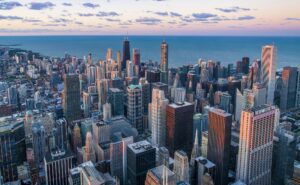
Why the new subtitle and image for this Blog? “Third Coast”? Click “About” (above right) for an overly-long explanation.
The Great Anaphoral Prayer of Saint Basil
We are now going to study this great Anaphora prayer, necessarily omitting much. By “tearing it apart” like this, we’ll miss the beauty and flow of this masterpiece of liturgical writing. So if you don’t usually hear it in church, please just once read it straight through. If you need a copy, I’ve provided one in the next Post (240.1)
Below, I’ve italicized the words of the Anaphora itself, so as to avoid confusion.
Let me add: I am in ‘way beyond my competence here. There are many deeper, longer, more profound commentaries available. I just want to reflect on parts of this Prayer that have taught me much over the years and caused me to think and ponder. If any of you have anything to add, please do so below.
Some things to notice:
1 Saint Basil, as with all the Fathers, says nothing new. In everything the authentic witness of the Holy Scriptures and early Church shines through.
2 The prayers of the Divine Liturgy are addressed to the Father. This 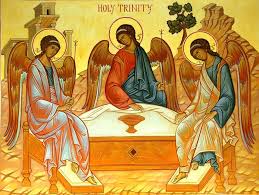 is Christ’s Offering to His Father (and our offering to Him in Christ), through the power of the Holy Spirit.
is Christ’s Offering to His Father (and our offering to Him in Christ), through the power of the Holy Spirit.
See how Rublev, in his symbolic depiction of the Trinity using the three angels who appeared to Abraham, has the Son and Spirit both inclining towards the Father.
All icons by permission of Saint Isaac’s Skete at skete.com
3 The prayers of the Anaphora are in second person plural (“we”) because this is our offering, all of us together. No “me and Jesus” religion here.
Mount Lebanon Choir, Holy Orthodox Church of Antioch, Syria
Now, picking it up where we stopped last week:
The Thrice-holy Hymn of the Seraphim has concluded.
Saint Basil now makes a seamless transition into the history of Creation and Salvation: Together with these blessed powers, loving Master, we sinners also cry out and say: Truly You are holy, most holy, and there are no bounds to the majesty of Your holiness. You are holy in all Your works, for with righteousness and true judgement You have ordered all things for us.
My pondering begins: Forgive me my doubts (after all these years…), but I sometimes look at the world and at my life and wonder: Has God really ordered things right? Is He really for us, on our side? Especially after someone I love dies I ask: God, is there no other way You could have made this world?
Listen to how Saint Basil sums up God’s work for us and our salvation from the beginning:
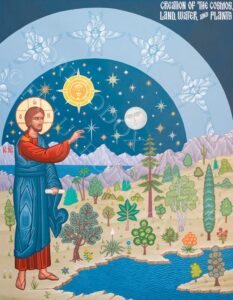
God began by fashioning, creating us. We exist by His grace alone. We belong to Him. That’s easy to ignore in this modern world where we know so much and control so many things – or think we do. But it is God’s electricity that we turn on, God’s world that we study and learn about, God’s earth that we pollute. All things come from Him. He is in charge here. We are not.
God made us out of the dust of the earth. * We are earthly. In the beginning God placed Adam and Eve in an earthly paradise of plenty. In Hebrew the word “Adam” means “man”, generic mankind; “Eve” means “living”, “because she would be the mother of all living.” (Genesis 2:20) The story of Adam and Eve is above all the story of mankind, all of us and each of us. The Garden of Eden is the natural innocent happiness, in union with God and nature, that we once possessed.
- In six literal days or in many billions of years? Not worth debating, at least from a theological point of view. The point of Genesis is: God made it.
God gave mankind a unique place in creation: He made us in His image. Like God we can think, love, plan, imagine, even create in a way using what He has given us. And like Him, we can live forever. He promised us eternal life and the enjoyment of good things in keeping his commandments.
But God also gave us free will. And when man disobeyed You, the true God, who had created Him, and was led astray by the guile of the serpent, and rendered subject to death through his own transgressions… Why did God forbid Man and Woman to eat from the tree of the knowledge of good and evil? We’re not told. But lets take a sort of silly analogy:
Why would you forbid your eight-year-old to drive your car, even though he wants to? Why did we grab hold of knowledge before we were able to handle it? – and we still aren’t. Because someone tempted us: the serpent, Satan – the tough kid from the other side of the tracks. “Ha! So your dad won’t let you drive? Chicken! You can do it! You can be just like him.” And so we did, and so we 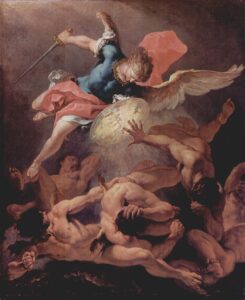 wrecked the car and injured ourselves, mortally. Where did the rotten kid, the serpent come from? We’re not told, only that “there was war in heaven… Michael and his angels” fought against “Satan and his angels… and they were cast down…” to earth. (Revelation 12). What happens on that level of reality is beyond our power to grasp.
wrecked the car and injured ourselves, mortally. Where did the rotten kid, the serpent come from? We’re not told, only that “there was war in heaven… Michael and his angels” fought against “Satan and his angels… and they were cast down…” to earth. (Revelation 12). What happens on that level of reality is beyond our power to grasp.
by Sebastiano Ricci, c. 1720
Neither the Scriptures nor the Lord Jesus nor Saint Basil explain the existence of evil or the reason for our present condition. Jesus said only that “an enemy has done this.” Matthew 13:29
However, out of this sin, this turning away from God and His will for us, come the evils that have plagued us ever since. Why did God allow this to happen? Why didn’t He stop us? Again we’re not told.
Here’s the best guess: God’s plan is to make beings who know the joy of choosing love – like Himself. God has absolute freedom, and “God is love”. That requires that we have genuine free will, the freedom to choose against Him. He could have made us automatons who can only obey, function – but robots cannot love, cannot know joy. God wants us to grow up to be like Him. As one of my professors said, the Bible is the story of mankind’s journey from the Garden in Genesis to the Heavenly City in the book of Revelation – with a major detour along the way.
 So here we are, cast out of Eden, banished… in Your righteous judgment… from paradise into this world. And we can’t go home again. Try to return to the natural innocent happiness of your childhood. It’s impossible. We were sent out into the world as we now know it, no longer innocent, no longer natural, no longer happy, and other peoples’ freedom also impinges on us. Worst of all, being separated from God necessarily ends in death, for God is Life. God’s righteous judgement was that, since we were captive to sin, this – what we have now – was the right way forward for us. Whether we understand it or like it or not.
So here we are, cast out of Eden, banished… in Your righteous judgment… from paradise into this world. And we can’t go home again. Try to return to the natural innocent happiness of your childhood. It’s impossible. We were sent out into the world as we now know it, no longer innocent, no longer natural, no longer happy, and other peoples’ freedom also impinges on us. Worst of all, being separated from God necessarily ends in death, for God is Life. God’s righteous judgement was that, since we were captive to sin, this – what we have now – was the right way forward for us. Whether we understand it or like it or not.
We all are born into a world that is still God’s world, His creation, but which is occupied by an “enemy”. The world is still good by nature; it is filled with people who are good by nature. We Orthodox reject the classical Protestant doctrine that mankind is “totally depraved”, that human nature is now entirely corrupt and sinful. We are still God’s good creation, but we are bent out of shape. Sin and evil are always good things twisted, contorted, distorted, turned away from God – and therefore they lead to death. Nothing endures in this fallen world, including us.
But God did not abandon us, He did not forget the work of His hands nor turn away from the creature He had made. The evidence for this is that we still exist! If He had turned away, we would no longer be. For countless years God worked chiefly behind the scenes, providing for us the salvation of regeneration which is in Your Christ Himself – working through Christ our God even before His Incarnation – to save us, rescue us, restore us to life. God gave all mankind dreams of dyings and risings to new life and visions of other and better worlds. He visited us in various ways in His tender mercy. He worked especially through a Chosen People, the Jews to reveal His existence, His unity, His moral law. You sent prophets, You performed mighty works by your holy ones who, in every generation, were well pleasing to You… the prophets…foretold…the salvation which was to come; You gave us the Law as an aid to show us the way to Life: “You shall love the Lord Your God with all Your heart and soul and mind and strength… you shall love your neighbor as yourself “. You appointed guardian angels – invisible presences guiding and guarding the world and each of us even when we are unaware of it.
And when the fulness of time was come, when the world was ready, when the time 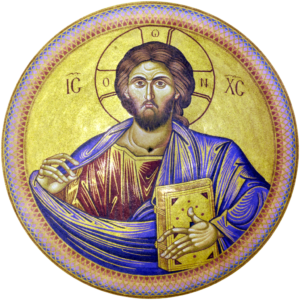 was right, You spoke to us through Your Son himself, through whom also You mades the ages, who is Himself the true image of God – that is, what we were created to be – who upholds all things by the Word of His power, who is equal to You, the God and Father. Twenty centuries ago He who was God before all ages… appeared on earth and dwelt with men…emptying Himself of His divine glory and prerogatives, taking on the form of a servant, born of her whom we now call the Theotokos, the one who gave birth to God, and took on our lowly body so that He might remake us into the image of His glory. As Saint Athanasios wrote, “God became man so that man might become god.”
was right, You spoke to us through Your Son himself, through whom also You mades the ages, who is Himself the true image of God – that is, what we were created to be – who upholds all things by the Word of His power, who is equal to You, the God and Father. Twenty centuries ago He who was God before all ages… appeared on earth and dwelt with men…emptying Himself of His divine glory and prerogatives, taking on the form of a servant, born of her whom we now call the Theotokos, the one who gave birth to God, and took on our lowly body so that He might remake us into the image of His glory. As Saint Athanasios wrote, “God became man so that man might become god.”
He became a citizen of this world. He gave us commandments of salvation. He released us from the delusion of idols and brought us into knowledge of…the true God and Father. Please read the Gospels, brothers and sisters. Christ taught us how to live, how to come to God and gain full abundant life.
Beginning with the Apostles, He gathered a new people to himself by Baptism, who in Him would be a royal priesthood: a people standing on the borderline between heaven and earth, restoring the world to God, bringing God into the world, a holy nation, a colony of heaven, an outpost of the Kingdom of God. The Church. And the center of our priestly work is here in this Divine Liturgy, where heaven and earth are united.
Having done all this, He gave himself a ransom to death, whereby we were held, sold into bondage under sin. Note closely: Basil says nothing about Christ “paying the price of our sins” to satisfy the Father’s demand. (This is not a Scriptural doctrine. Here is where Orthodoxy differs profoundly from most of Western Christianity.) Basil says the ransom He paid was not to God, but to death. Why did He choose to die? So He could go before us, leading our way into death, conquering death and having descended into hades through the cross… so that He might fill all things with  himself… He invaded hades, sheol, the underworld, the devil’s dark kingdom of death and set the prisoners free, so that He the Good Shepherd could rescue all His lost sheep.
himself… He invaded hades, sheol, the underworld, the devil’s dark kingdom of death and set the prisoners free, so that He the Good Shepherd could rescue all His lost sheep.
Thereby…He loosed the pains of death and rose again on the third day, making a way for all flesh unto the resurrection of the dead – “I go to prepare a place for you…so that where I am you may be also” (John 14:2-3) – for it was not possible that the Author of Life should be held by corruption. So He became the firstborn of those who have fallen asleep, the firstborn from the dead, the first in all things. The Resurrection – this is Saint Basil’s emphasis. This is the Church’s emphasis. This is why from the beginning Christians have worshiped on the first day of the week, the day Christ arose. And …ascending into heaven, He sat down at the right hand of the Father. Jesus Christ is His Father’s “right hand man”.
…and He shall come again to render to every man according to his works. This is Christ’s promise: The world will not go on like this forever. He will come and set things right. Again note: Saint Basil says that each of us will be judged not according to his faith, not according to his doctrines, not according to his spiritual experiences, not according to his religious affiliation, but according to his works.
In the Scriptures there is no salvation by “faith alone”, no salvation without “good works”. “Faith without works is dead.” (James 2:20) “Inasmuch as you have done it to the least of these my brethren, you have done it to me.” (Matthew 25:40) That will tell the tale.
And that, according to Saint Basil the Great, is the story of our Salvation.
All of this will now be made present, accessible to us, in what follows in the Divine Liturgy.
Next Week: The Blessing of the Holy Gifts
Week after next: Holy Communion